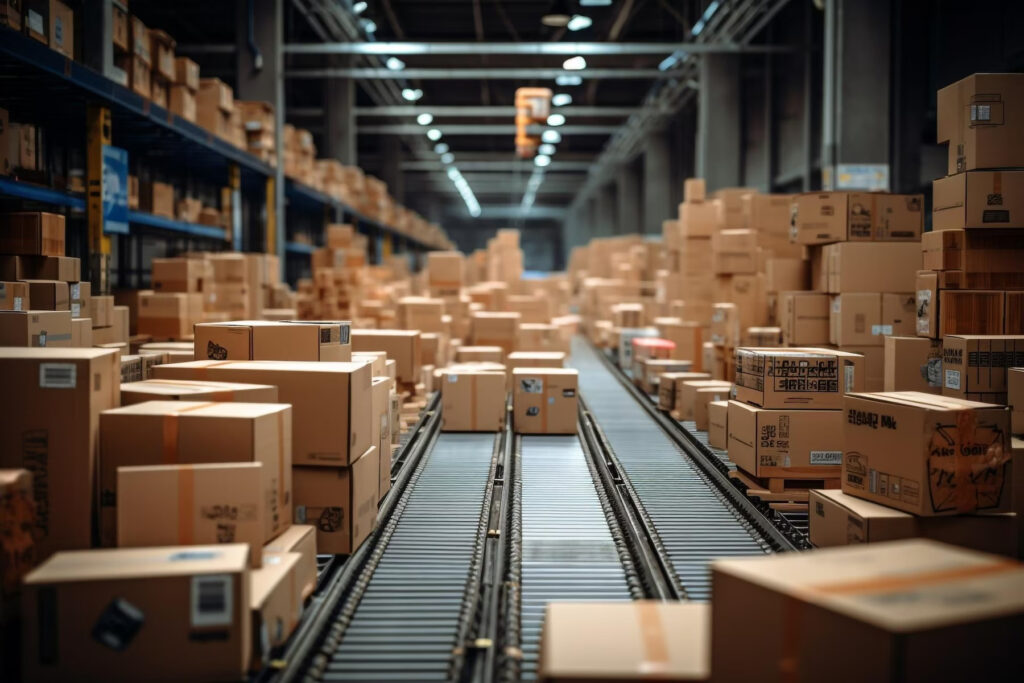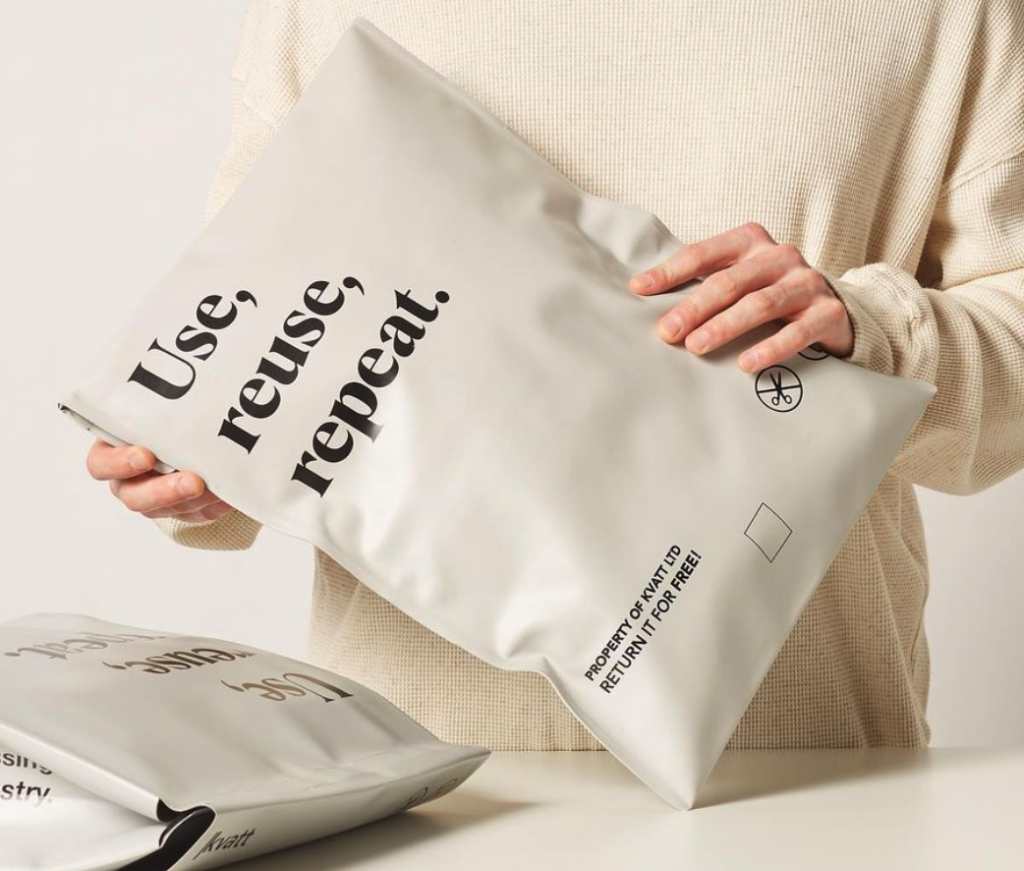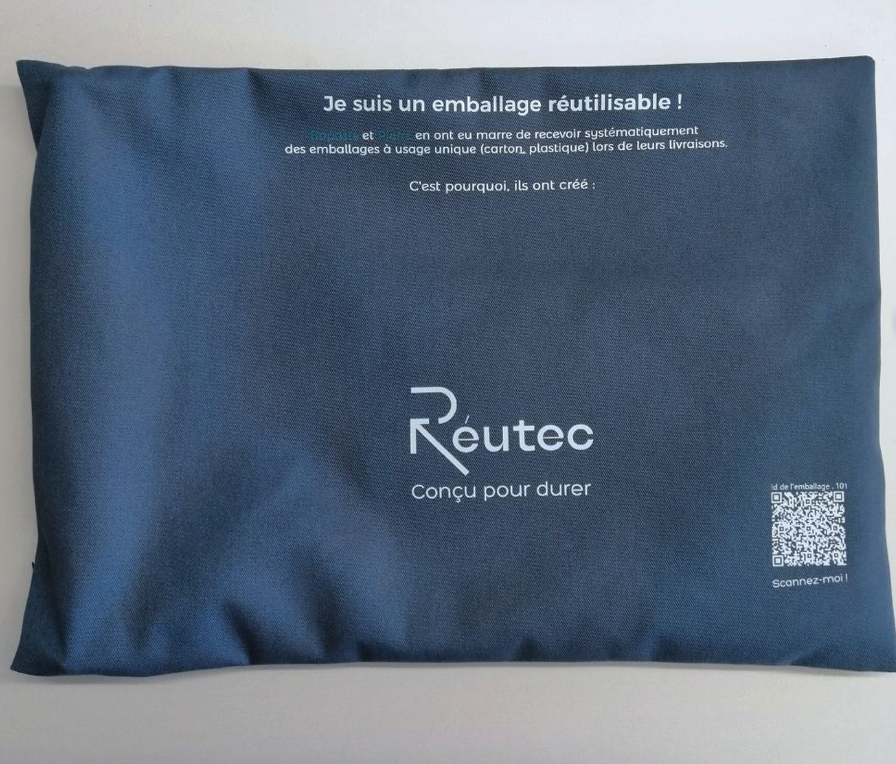The AGEC law
The AGEC (Anti-Waste for a Circular Economy) law was enacted in France in February 2020. It aims to reduce waste by encouraging the use of reusable packaging and to promote a more circular economy, where resources are reused and waste minimised. One of the law’s key measures concerns single-use e-commerce packaging.
From 2023, e-tailers must gradually reduce the use of single-use plastic packaging. The law encourages the adoption of reusable, recyclable or biodegradable packaging solutions.
To find out more : https://www.legifrance.gouv.fr/jorf/id/JORFTEXT000045536300
The effects of e-commerce :
The exponential growth of online shopping has led to a significant increase in packaging waste, posing a serious environmental problem. Every year, millions of tonnes of cardboard, plastic and other packaging materials end up in landfill or are incinerated, contributing to pollution and the depletion of natural resources. This accumulation of waste leads to greenhouse gas emissions, an increase in plastic pollution in the oceans and growing pressure on waste management infrastructures. However, there are several solutions to this problem.

Alternatives to single-use packaging :
In fact, there are several environmentally-friendly alternatives to standard e-commerce packaging, designed to reduce waste and minimise environmental impact. Here are some of the main alternatives: packaging made from recycled and recyclable materials, biodegradable or compostable packaging, packaging designed to be more efficient and reduce the amount of material used, and finally, reusable packaging.
Reusable packaging :
Of all these eco-responsible alternatives, we’re going to focus on reusable packaging.
Reusable e-commerce packaging represents a major innovation in the e-commerce sector, addressing issues around sustainability and waste management. Faced with an explosion in the number of parcels shipped every day, the e-commerce industry is turning to greener solutions to reduce its environmental footprint.
As the name suggests, reusable packaging is designed to be used over and over again, unlike traditional disposable packaging. They are often made from sustainable materials such as recycled fabrics or innovative materials. They are designed to resist wear and damage during transport and handling, ensuring a long life.
The advantages of reusable packaging :
- Firstly, it considerably reduces the amount of waste produced by e-commerce deliveries. Each time packaging is reused, new materials are not produced and the energy required to manufacture them is not consumed. It also reduces the CO2 emissions associated with waste management and the production of new packaging.
- Secondly, reusable packaging often offers practical features for consumers and businesses. They can be designed to be easily folded or compacted, making them easy to store and return.
- What’s more, these solutions encourage a circular economy, where materials are used optimally and circulate in the economy for as long as possible. This creates a virtuous circle in which resources are preserved and environmental impact is reduced.
However, for this model to be truly successful, it is vital that the returns procedures are well designed for consumers, making returns easier. These procedures must be simple and accessible for customers.
Finally, reusable e-commerce packaging offers a solution for reducing the environmental impact of deliveries, while promoting a circular economy and meeting consumer expectations in terms of sustainability.
Some players in the reusable packaging sector :
To illustrate this, let’s take a look at five companies that stand out in the field of reusable e-commerce packaging: Hipli, Opopop, Mobius Pack, Kvatt and Reutec.
Hipli
- Hipli, founded in France by Anne-Sophie Raoult and Léa Got in July 2020, is a company dedicated to reducing packaging waste from e-commerce. The company stands out for its flagship product, the “hipli bag“, a reusable and compostable bag made from natural materials such as linen and organic cotton. Designed to replace disposable plastic bags, the hipli bag offers a practical and ecological solution for environmentally conscious consumers. Their solution is based on a simple but effective model: after receiving their order, customers can return the packaging free of charge by dropping it in a letterbox. Once collected, the packages are cleaned and inspected before being put back into circulation.

To find out more : https://hipli.fr
Opopop
- Opopop is a French company co-founded by Charlotte Darmet and Antonin Grêlé-Rouveyre which, like Hipli, specialises in reusable pouches. They are made from recycled materials and are designed to last up to 100 cycles of use. The pouches are practical in design, lightweight and easy to fold, making them easy to return for reuse. This is because the packaging is sent to customers with their order, and can then be returned to the company once it has been emptied. Opopop then takes care of cleaning and, if necessary, repairing the packaging so that it can be used again. In addition to sustainability, Opopop is committed to minimising its carbon footprint by optimising the logistics of returning packaging. This approach reduces waste and promotes a circular economy.

To find out more : https://opopop.com
Mobius Pack
- Mobius Pack is a French start-up founded in 2021 by Victor Lescure and joined by Julien Lemarchand. It offers three ranges of recyclable and reusable packaging, with a variety of formats adapted to the different products being transported. The first range is MobiusMOUSSE, which protects fragile consignments, ensuring that they arrive intact, both the product and its packaging. Then there’s MobiusFLEX, which offers a reusable packaging solution to keep track of their users’ shipments in a sustainable way. And finally, there’s MobiusAIR, which is an envelope with eco-friendly self-inflating cells/bubbles that offers optimum protection for their users’ shipments, while using recycled materials, including paper and cardboard. All three ranges are also equipped with reusable labels, simplifying the return and reuse process.
To find out more : https://www.mobiuspack.com
Kvatt
- Kvatt, an innovative Swiss start-up in the field of reusable e-commerce packaging, has as its slogan “Use, reuse, repeat”. Founded by Gianfranco Bächtold, it has developed a reusable packaging solution called the Kvatt bag, designed to hold various types of product during shipments. The lifespan of each Kvatt bag depends on the product and its intended use, but Kvatt guarantees that they are designed to withstand at least 20 uses. Each Kvatt bag comes with a QR code for easy returns using the instructions provided by the company. For each order, Kvatt provides a free returns label, allowing you to return the bag free of charge. These products are designed to be durable and reusable, offering far greater longevity than single-use packaging.

To find out more : https://www.kvatt.com
Réutec
- Réutec, a French start-up founded in 2022 by Pierre Malbranque and Baptiste Peru, has developed a reusable packaging solution made from textile waste that can withstand up to 100 cycles of use. Three types of packaging are offered: pouches, ideal for light, non-fragile items (clothing, fashion accessories, goodies, etc.); boxes, suitable for products requiring extra protection (technological products, small electrical appliances, jewellery, luxury goods, crockery, etc.), using sheets of recycled textiles compressed to create a protective structure; and finally, customised solutions, offering protection for heavy, fragile or bulky items, whatever their complexity.

To find out more : https://www.reutec.fr
Ultimately, the adoption of reusable packaging by e-commerce companies and their customers represents an important step towards more sustainable consumption. As well as reducing waste, these solutions raise consumer awareness of environmental issues and promote more environmentally-friendly practices. The initiatives of Hipli, Opopop, Mobius Pack, Kvatt and Reutec show that it is possible to reconcile logistical efficiency and sustainability, paving the way for a new era of more responsible and ecological e-commerce. 10% of e-commerce packaging must be reusable by 2030 in Europe, rising to 50% by 1 January 2040. (Soure : https://hipli.fr/2023/04/06/colis-reutilisable-au-nom-de-la-loi/ ).
To find out more about us : https://www.blocbox.fr